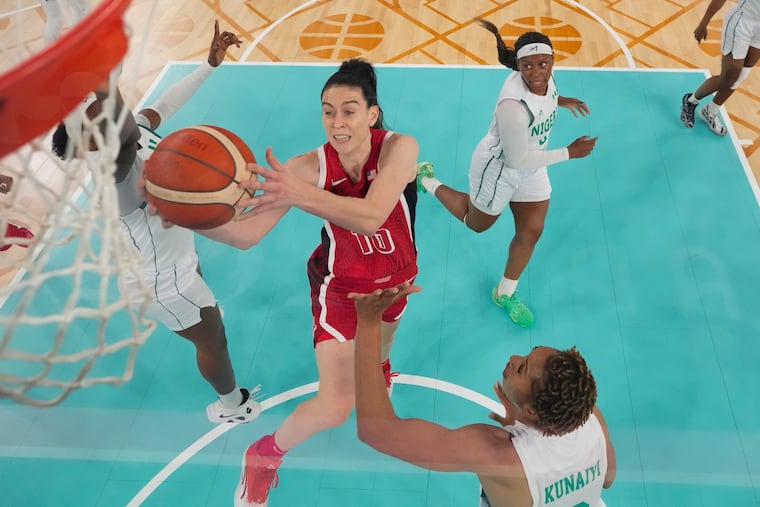Breanna Stewart thinks the WNBA is ‘in a great place’ after the Olympics. But she sees more growth on the horizon.
At last, the WNBA and its players have achieved much of what they've long fought for. Stewart was glad to celebrate that as she returned to playing for the New York Liberty.

NEW YORK — The lineage of the U.S. women’s basketball team’s success at the Olympics is so strong now that sometimes one gold medal might blend into the next in our collective memory.
But this time, there’s something different from the previous seven titles — and it’s not how close the U.S. came to not winning it.
Over all those years, the U.S. winning gold understandably was used by the players as leverage to push their sport’s growth, from fan interest to TV coverage, to investment in player salaries, facilities, arenas, and so on.
Now, at last, the WNBA and its players have achieved much of what they long fought for. The league’s stars have sent TV viewership soaring. New broadcast deals worth $2.2 billion are on the way, with potentially more to come, and that money has helped fund full-time charter flights leaguewide. A new collective bargaining agreement is expected soon, too, and there’s no doubt that higher salaries are coming.
» READ MORE: After 8 years of hard work in the WNBA, North Philly’s Kahleah Copper is officially an Olympian and fully a star
Of course, none of this means the work of growing the league is done. It never is, and no league — in any sport — would say it ever should be.
But right now, as the WNBA’s Olympians return to the league, they haven’t minded taking a moment to enjoy how far they’ve come.
“Before, it’s [been] like coming back from an Olympics where you’re trying to build and use this as fuel and motivation,” New York Liberty and U.S. superstar Breanna Stewart said at her first post-Olympics home game on Tuesday. “We’re not doing that as much, just because people are kind of appreciating us for what we do.”
‘The highest of the high’
There indeed was much appreciation Tuesday during a 94-74 rout of the Dallas Wings, which grew the first-place Liberty’s record to 24-4. The crowd roared when Stewart and Sabrina Ionescu were introduced as Olympic champions, and Stewart then delivered a game-high 26 points and 12 rebounds.
» READ MORE: North Philly’s Kahleah Copper met the moment for Team USA in its thrilling Olympic gold medal game win
Ionescu didn’t play because of a neck injury, so she wasn’t available to offer her own reflections. But Stewart added a few about her teammate, and not just because they won together in Paris.
Stewart knows the trappings and dangers of fame and that Ionescu is no stranger to them. They’ve been in the spotlight since their days as college phenoms, Ionescu at Oregon and Stewart when she won four straight national titles at Connecticut.
But when you win your first Olympic gold medal, it takes you to a new level. Stewart lived it in 2016, and now it’s Ionescu’s turn.
“I think that her life is going to change because she’s an Olympic gold medalist, and that’s something that not many people can say,” said Stewart, who now owns golds from Rio de Janeiro in 2016, Tokyo in 2021, and Paris this year. “With all the accolades, that’s the highest of the high: representing your country, winning a gold.”
» READ MORE: Kahleah Copper gave everyone at the Olympics a quick lesson in North Philly history and hoops
These days, that perspective is understood not just within the United States. Liberty coach Sandy Brondello, an Australia native, has seen the sport’s growth as a player and coach in the WNBA, and as the coach of her country’s women’s national team — with its own great history of WNBA players — since 2017.
“We’ve been building this league for 25-plus years, but you look at our male counterparts and it took them a while to get to where we want to go to,” she said. “Right now, I think women’s sport is a movement, and I think the Olympics highlight that.”
More potential growth awaits
Now the WNBA can further capitalize on it, just as the NWSL can further capitalize on the U.S. women’s soccer team’s Olympic gold.
Both leagues are blessed with a vibrant mix of household-name veterans and dynamic young phenoms, with further fuel from more fans, more TV money, and more expansion teams (though not to Philadelphia yet).
“Knowing that we’re in a very special time, but also, the opportunity to opt in or out of the new CBA [next year], you guys saw the TV deal,” Stewart said, “we’re in a great place, but we’re not going to settle for anything.”
» READ MORE: U.S. women’s soccer returns to the sport’s pinnacle, winning gold over Brazil at the Olympics
That is, by the way, young phenoms, plural — a point soccer fans are used to, but basketball fans occasionally need polite reminding of. Indiana’s Caitlin Clark obviously is the most talked-about current figure on the hardwood, but Chicago’s Angel Reese has also been sensational, and Kamilla Cardoso has grown alongside her with the Sky.
Then look at who will come from the college ranks in the next few years: Paige Bueckers, JuJu Watkins, Hannah Hidalgo, and more.
(If you thought it was hard to make this year’s Olympic team, good luck to anyone trying to guess the U.S. team for 2028 in Los Angeles.)
“We’ve got, obviously, amazing players that people get to know, but we’ve also got these amazing young rookie players coming in, too, that continue to elevate our league,” Brondello said. “It’s just the right time — and it’s better late than never.”
» READ MORE: Dawn Staley knows best: Caitlin Clark and Kamilla Cardoso’s greatest days will come as pros